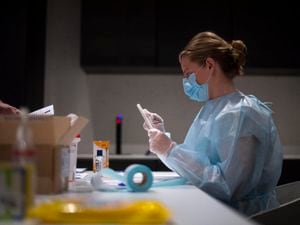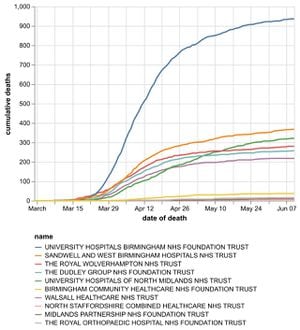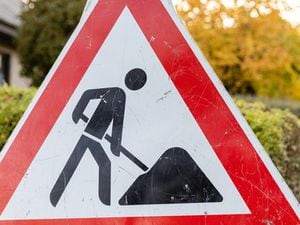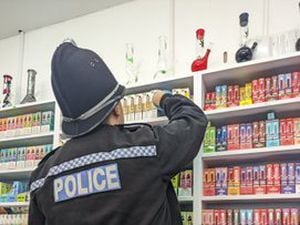'Significant gap' between coronavirus cases across Black Country
A "significant gap" is emerging in the number of coronavirus cases between different Black Country boroughs, it has been said.

It comes as Black Country health chiefs warned hospitals to "plan for the worst" ahead of a forecasted second wave of Covid-19.
A council meeting heard Wolverhampton has been the worst hit area in the West Midlands for coronavirus.
The borough has 392 cases per 100,000 people. In comparison, Walsall is second with 388 and Sandwell is third with 325.
Dudley ranks at seventh on the list with 277 cases per 100,000 of the population. Birmingham comes in at sixth with 289 cases.
In other areas, the figure in Staffordshire stands at 262 coronavirus cases per 100,000 people. The county came in ninth out of 14 areas in the Midlands region.
Cases per 100,000 people by area
Data as of June 11, by local authority area.
Wolverhampton: 1,028 cases (392 per 100,000 people)
Walsall: 1,100 (388 per 100,000 people)
Sandwell: 1,066 (325.6 per 100,000 people)
Birmingham: 3,301 (289.2 per 100,000 people)
Dudley: 888 cases (277 per 100,000 people)
Staffordshire: 2,309 cases (263.8 per 100,000 people)
As of Thursday, 2,443 deaths had been confirmed in hospitals across the Black Country, Birmingham and Staffordshire.
On top of this 569 deaths have been confirmed in care homes, although this data is only available for April 10 to June 5 and the region's first hospital deaths happened on March 8.
You can see the latest number of hospital deaths in your area here.

Bal Kaur, Dudley's director of public health, said the regional rankings have "significantly changed" since the viral outbreak.
She told Dudley Council's health and adult social care scrutiny committee: "We [Dudley] were second in the region to have had our first case.
"But through joint collaborative response, we have managed to keep our cases low and reduce, thankfully, deaths in the borough.
"There is a significant gap emerging between the areas that have got the highest cases."
As of May 24, there had been 938 recorded cases of Covid-19 in Dudley. However 70 of these cases were among 450 in the Black Country that were wrongly reported as positive due to a lab error and as of June 11 there had been 888 confirmed cases in Dudley.
The meeting heard that the borough had seen 288 coronavirus deaths, with 210 have in hospitals, 62 in care homes, 12 at people's homes, three in hospices and one elsewhere.
The number of care home deaths reported at the meeting is 16 higher than the 46 reported in Dudley by the Office for National Statistics this week.
More coverage:
Meanwhile NHS data released on Wednesday showed there have been 256 death at Russells Hall Hospital, although not all of these patients will have been from the Dudley borough.
Ms Kaur added: "Our care homes [in Dudley] didn't experience a higher rate of death as other areas did. Our sort of peak was quite shallow.
"Over the last weeks, the death rate has significantly decreased and the numbers of deaths are down to one or zero, in fact.
"So they are almost down to normal levels now."
Second wave warning
Health chiefs are planning for a second spike in coronavirus cases.
Matthew Hartland, deputy chief officer at the Black Country and West Birmingham CCG, told the meeting: "We don't know what will happen in terms of Covid. We don't know when the second peak will hit and if there will be a third.
"When you lay that over the fact that it is likely - or has the potential - to be aligned to an influenza, a norovirus, over winter, we have to plan and predict for the worst.
"Which is why it will have an impact and knock-on effect on our restoration and recovery.
"So we don't know what is going to happen. It is a hugely complex ask for all partners.
"But I think the key message about what we are doing is being safety first.
"So the safety of patients, the safety of our staff, the safety of all the service users and businesses that we have into our facilities and care homes."
'Confident in plans to keep Wolverhampton safe'
John Denley, Wolverhampton Council's director of public health, said: "We are working closely with health partners to reduce the spread of coronavirus in Wolverhampton.
"We have always said that testing is one of the most important things in being able to control and manage the virus, That’s why we've had an extremely proactive approach to testing in Wolverhampton, which may explain why cases have been higher here than in some other areas.
"We opened a drive through test centre as early as 9 March, and were one of the first areas in the country to do so. We have also used and promoted all available national testing routes and provided proactive mass testing in our city’s care homes.
"These efforts have helped us actively find more cases of coronavirus, which in turn have enabled us to reduce the risk to vulnerable people and high-risk settings, such as care homes.
"We are confident in our plans to keep Wolverhampton safe. We have continually reminded residents of the Government guidance and the importance of taking extra care during lockdown and, as we gradually open particular services, we are ensuring that this is done cautiously and with rigorous risk assessments and plans in place.
"We are working closely with businesses, schools, care homes and all other settings to support them to have safe working environments which protect staff, service users and the public.
"Part of this work includes supporting settings to monitor for any outbreaks, and ensure plans are in place to respond quickly and effectively should cases be identified.
"We would urge people to remember that this remains a very infectious and deadly virus and that the continuing efforts of everyone in maintaining social distancing and good handwashing will help prevent the spread of coronavirus and keep the city safe.
"If anyone develops symptoms they must self-isolate and get tested. And if people are contacted by NHS Test and Trace to say they have been a close contact of someone who has tested positive for Covid-19, they must self-isolate for 14 days to prevent any further unintentional spread of the virus."





